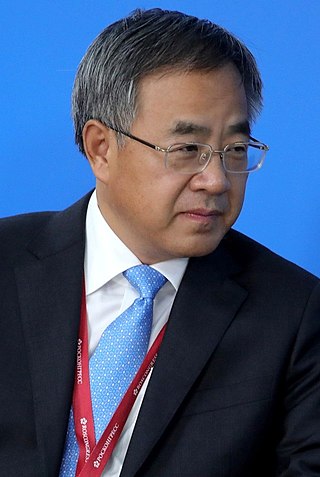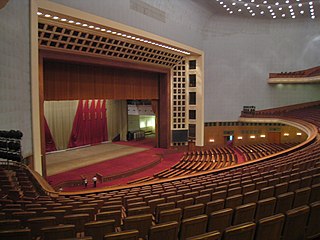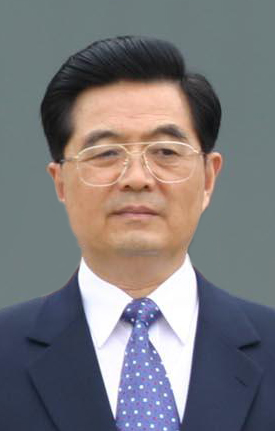
The Politburo Standing Committee (PSC), officially the Standing Committee of the Political Bureau of the Central Committee of the Communist Party of China, is a committee consisting of the top leadership of the Chinese Communist Party (CCP). Historically it has been composed of five to eleven members, and currently has seven members. Its officially mandated purpose is to conduct policy discussions and make decisions on major issues when the Politburo, a larger decision-making body, is not in session. According to the party's constitution, the General Secretary of the Central Committee must also be a member of the Politburo Standing Committee.

Hu Jintao is a Chinese retired politician who served as the general secretary of the Chinese Communist Party (CCP) from 2002 to 2012, the president of China from 2003 to 2013, and chairman of the Central Military Commission (CMC) from 2004 to 2012. He was a member of the CCP Politburo Standing Committee, China's de facto top decision-making body, from 1992 to 2012. Hu was the fifth paramount leader of China from 2002 to 2012.

Wen Jiabao is a Chinese retired politician who served as the premier of China from 2003 to 2013. In his capacity as head of government, Wen was regarded as the leading figure behind China's economic policy. From 2002 to 2012, he held membership in the Politburo Standing Committee of the Chinese Communist Party, the country's de facto top power organ, where he was ranked third out of nine members and after general secretary Hu Jintao and Wu Bangguo, chairman of the Standing Committee of the National People's Congress.

Huang Ju was a Chinese politician and a high-ranking leader in the Chinese Communist Party (CCP). He was a member of the Politburo Standing Committee of the CCP, China's top decision making body, between 2002 until his death in 2007, and also served as the first-ranked vice premier of China beginning in 2003. He died in office before he could complete his terms on the Standing Committee and as vice premier.
Wu Guanzheng, also spelled as Wu Kuan-cheng is a former Chinese politician and one of the major leaders of the Chinese Communist Party during the administration of Hu Jintao. He served on the Politburo Standing Committee, the country's top ruling body, from 2002 to 2007. During that time he also served as the Secretary of the Central Commission for Discipline Inspection of the Chinese Communist Party, the party's anti-graft body. He had a lengthy political career, having served as mayor of Wuhan, Governor then Party Secretary of Jiangxi, then party chief of Shandong. Wu retired in 2007 and left public life.
Generations of Chinese leadership is a term historians use to characterize distinct periods of the leadership of the Chinese Communist Party (CCP) and, by extension, successive changes in the ideology of the CCP. Historians have studied various periods in the development of the government of the People's Republic of China by reference to these "generations".

The Harmonious Society is a socioeconomic concept in China that is recognized as a response to the increasing alleged social injustice and inequality emerging in mainland Chinese society as a result of unchecked economic growth, which has led to social conflict. The governing philosophy has therefore shifted around economic growth to overall societal balance and harmony. Along with a moderately prosperous society, it was set to be one of the national goals for the ruling vanguard Communist Party.
Eight virtues may refer to:

Hu Chunhua is a Chinese politician. He currently serves as Vice Chairman of the National Committee of the Chinese People's Political Consultative Conference since 2023. From 2018 to 2023, he served as Vice Premier of the State Council of the People's Republic of China.

The 17th National Congress of the Chinese Communist Party was held in Beijing, China, at the Great Hall of the People from 15 to 21 October 2007. Congress marked a significant shift in the political direction of the country as CCP General Secretary Hu Jintao solidified his position of leadership. Hu's signature policy doctrine, the Scientific Development Concept, which aimed to create a "Socialist Harmonious Society" through egalitarian wealth distribution and concern for the country's less well-off, was enshrined into the Party Constitution. It was succeeded by the 18th National Congress of the Chinese Communist Party.
Meng Xuenong is a Chinese politician. Meng worked as a factory worker in Beijing before getting involved in politics through the local Communist Youth League organization. He was the Vice Mayor of Beijing between 1993 and 2003, before being promoted to mayor for a brief interlude in 2003. He was sacked as mayor only after a few months on the job due to his government's mismanagement of the SARS epidemic.

Liu Yandong (Chinese: 刘延东) is a retired Chinese politician. She recently served as the Vice Premier of the People's Republic of China, and was a member of the Politburo of the Chinese Communist Party from 2007 to 2017, a State Councilor between 2007 and 2012, and headed the United Front Work Department of the Communist Party between 2002 and 2007.

The Scientific Outlook on Development, sometimes translated to either the scientific development concept, or as the scientific development perspective, is one of the guiding socio-economic principles of the Chinese Communist Party (CCP), credited to former Chinese leader Hu Jintao and his administration, who was in power from 2002 to 2012.

Sun Chunlan is a retired Chinese politician. She served as the second-ranked Vice Premier of the People's Republic of China and the highest-ranking incumbent female government official until March 2023. Previously, she served as a member of the Politburo of the Chinese Communist Party.

Ling Jihua is a former Chinese politician and one of the principal political advisers of former leader Hu Jintao. Ling was best known for his tenure as chief of the General Office of the Chinese Communist Party between 2007 and 2012. Ling was charged with corruption, bribery, and other misconduct and was sentenced to life imprisonment as part of a larger anti-corruption campaign carried out by Xi Jinping.
Cross-Strait Economic, Trade and Culture Forum, commonly known as the Kuomintang–Chinese Communist Party Forum, was originally proposed by the Kuomintang and the Chinese Communist Party, jointly organized in order to promote cross-strait economic, trade, cultural exchanges dialogue and integration.
Events in the year 2002 in China.

The Campaign to Maintain the Advanced Nature of Communist Party Members is a political rectification campaign launched under the leadership of Hu Jintao. The campaign aims to educate Chinese Communist Party (CCP) members on Marxist ideological orthodoxy, improve "inner-party democracy," and combat corruption and other "social contradictions" that threaten the viability of continued CCP rule. The official Xinhua News Agency wrote that the campaign is "practice for the Party's efforts to promote the great cause of socialism with Chinese characteristics." The campaign was closely linked to Hu Jintao's Scientific Outlook on Development.

The Communist Youth League of China (CYLC), also known as the Young Communist League of China or simply the Communist Youth League (CYL), is a people's organization of the People's Republic of China for youth between the ages of 14 and 28, run by the Chinese Communist Party (CCP). The league is organized on the party pattern. Its leader is its First Secretary, who is an alternate member of the Central Committee of the CCP. The incumbent First Secretary is A Dong, appointed in May 2023. The Communist Youth League is also responsible for guiding the activities of the Young Pioneers.

The 20th National Congress of the Chinese Communist Party (CCP), commonly referred to as Èrshí Dà, was held in the Great Hall of the People, Beijing from 16 to 22 October 2022. The National Congress is the highest organ of the party, and is stipulated to be held every five years. The conference had 2,296 delegates and 83 specially invited delegates.
















